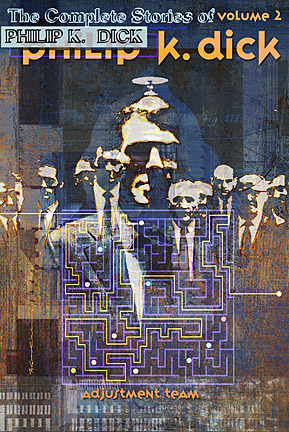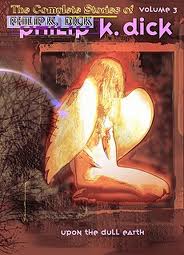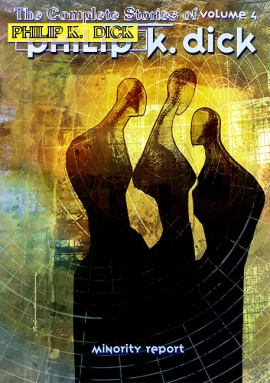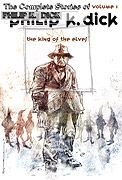The Complete Stories of Philip K. Dick
Bill's Stuff - Philip K. Dick
Volume 1: The King of the Elves [1947-1952]
Dust Jacket by Bill Sienkiewicz
Philip K. Dick (1928-1982) was one of the seminal figures of 20th century science fiction. His many stories and novels, which include such classics as The Man in the High Castle and Do Androids Dream of Electric Sheep?, reflect a deeply personal world view, exploring the fragile, multifarious nature of reality itself and examining those elements that make us — or fail to make us — fully human. He did as much as anyone to demolish the artificial barrier between genre fiction and “literature,” and the best of his work has earned a permanent place in American popular culture.
The King of the Elves is the opening installment of a uniform, five-volume edition of The Collected Stories of Philip K. Dick, expanded from the previous Collected Stories set to incorporate new story notes, and two added tales, one previously unpublished, and one uncollected. This generous collection contains 22 stories and novellas including Dick’s first published story, “Beyond Lies the Wub,” together with such landmark tales as “The Preserving Machine,” in which an attempt to preserve our fragile cultural heritage takes an unexpected turn, “The Variable Man,” a brilliantly imagined novella encompassing war, time travel, and the varied uses of technology, and the title story, in which Shadrach Jones, owner of a dilapidated gas station in Colorado, stumbles into an ongoing war between trolls and elves, and encounters a fantastic — and utterly unexpected — destiny. Like the best of Dick’s novels, these stories offer a wide variety of narrative and intellectual pleasures, and provide an ideal introduction to one of the singular imaginations of the modern era.
Table of Contents
- Stability
- Menace React
- Roog
- The Little Movement
- Beyond Lies the Wub
- The Gun
- The Skull
- The Defenders
- Mr. Spaceship
- Piper in the Woods
- The Infinites
- The Preserving Machine
- Expendable
- The Variable Man
- The Indefatigable Frog
- The Crystal Crypt
- The Short Happy Life of the Brown Oxford
- The Builder
- Meddler
- Paycheck
- The Great C
- Out in the Garden
- The King of the Elves
- Colony
- Prize Ship
- Nanny
- Notes
Volume 2: Adjustment Team [1952-1953]

Dust Jacket Illustration by Bill Sienkiewicz
Philip K. Dick (1928-1982) was one of the seminal figures of 20th century science fiction. His many stories and novels, which include such classics as The Man in the High Castle and Do Androids Dream of Electric Sheep?, reflect a deeply personal world view, exploring the fragile, multifarious nature of reality itself and examining those elements that make us — or fail to make us — fully human. He did as much as anyone to demolish the artificial barrier between genre fiction and “literature,” and the best of his work has earned a permanent place in American popular culture.
Adjustment Team is the second installment of a uniform, five-volume edition of The Collected Stories of Philip K. Dick. This wide-ranging collection contains 26 stories and novellas from the extraordinarily productive years of 1952 and 1953, along with extensive story notes. Included here are “The Cookie Lady,” an account of a young boy whose relationship with a lonely widow results in a bizarre act of transformation, “Second Variety” (filmed in 1995 as Screamers), a novella that powerfully evokes a post-apocalyptic society overrun by all-too-human looking robots known as “Claws,” and the title story, in which a small accident of timing leads real estate salesman Ed Fletcher to an unexpected confrontation with the malleable nature of a once familiar world. Like its predecessor, The King of the Elves, this new volume offers both an astonishing variety of narrative pleasures and a fascinating glimpse into the evolution of a major American artist.
Table of Contents
- The Cookie Lady
- Beyond the Door
- Second Variety
- Jon’s World
- The Cosmic Poachers
- Progeny
- Some Kinds of Love
- Martians Come in Clouds
- The Commuter
- The World She Wanted
- A Surface Raid
- Project: Earth
- The Trouble with Bubbles
- Breakfast at Twilight
- A Present for Pat
- The Hood Maker
- Of Withered Apples
- Human Is
- Adjustment Team
- The Impossible Planet
- Impostor
- James P. Crow
- Planet for Transient
- Small Town
- Souvenir
- Survey Team
- Prominent Author
- Notes
Volume 3: Upon the Dull Earth

Dust jacket by Bill Sienkewicz
Philip K. Dick (1928-1982) was one of the seminal figures of 20th century science fiction. His many stories and novels, which include such classics as The Man in the High Castle and Do Androids Dream of Electric Sheep?, reflect a deeply personal worldview, exploring the fragile, multifarious nature of reality itself and examining those elements that make us—or fail to make us—fully human. He did as much as anyone to demolish the artificial barrier between genre fiction and “literature,” and the best of his work has earned a permanent place in American popular culture.
Upon the Dull Earth is the third installment of a uniform, five-volume edition of The Collected Stories of Philip K. Dick. This generous collection contains 22 stories and novellas written in 1953 and 1954, along with extensive—and valuable—story notes. Included here are a number of bona fide PKD classics, among them the title story, the brilliantly conceived account of a bizarre, ultimately catastrophic resurrection, “The Father-Thing,” in which a young boy comes to realize that his once familiar father has somehow changed, and “The Golden Man” (filmed in 2007 as “Next”), which tells the tale of a golden skinned mutant who may represent the future direction of the human race. These and all the other stories in this important and necessary book offer a wide range of literary and intellectual pleasures. At the same time, they provide a fascinating glimpse into the continuing development of this iconic—and hugely influential—figure.
Table of Contents
- Fair Game
- The Hanging Stranger
- The Eyes Have It
- The Golden Man
- The Turning Wheel
- The Last of the Masters
- The Father-Thing
- Strange Eden
- Tony and the Beetles
- Null-O
- To Serve the Master
- Exhibit Piece
- The Crawlers
- Sales Pitch
- Shell Game
- Upon the Dull Earth
- Foster, You’re Dead
- Pay for the Printer
- War Veteran
- The Chromium Fence
- Misadjustment
- A World of Talent
- Psi-Man Heal my Child
- Notes
Volume 4: The Minority Report

Dust jacket by Bill Sienkewicz
Philip K. Dick (1928-1982) was one of the seminal figures of 20th century science fiction. His many stories and novels, which include such classics as Ubik and Do Androids Dream of Electric Sheep?, reflect a deeply personal world view, exploring the fragile, multifarious nature of reality itself and examining those elements that make us—or fail to make us—fully human. He did as much as anyone to demolish the artificial barrier between genre fiction and “literature,” and the best of his work has earned a permanent place in American popular culture.
The Minority Report is the fourth installment of a uniform, five-volume edition of The Collected Stories of Philip K. Dick. This generous collection contains 18 stories and novellas written between 1954 and 1963, years in which Dick produced some of his most memorable work, including such novels as Martian Time Slip and the Hugo Award-winning The Man in the High Castle. Included here are “Autofac,” a post-apocalyptic tale in which humans share the devastated Earth with the machines they have created but no longer fully control; “The Mold of Yancy,” a portrait of a world reduced to bland conformity by the vapid—and ubiquitous—pronouncements of a virtual demagogue; and “The Days of Perky Pat,” another post-apocalypse story in which Earth’s survivors find temporary solace in the Perky Pat game, a game rooted in the images and memories of a world that no longer exists. Finally, the classic title story, filmed by Steven Spielberg as Minority Report, posits a future state in which the “Precrime” bureau, aided by a trio of pre-cognitive mutants, arrests and incarcerates “criminals” for crimes they have not yet committed. Like its predecessors, this extraordinary volume is a treasure house of story, offering narrative pleasures and intellectual excitement in equal measure.
Table of Contents:
- Autofac
- Service Call
- Captive Market
- The Mold of Yancy
- The Minority Report
- Recall Mechanism
- The Unreconstructed M
- Explorers We
- War Game
- If There Were No Benny Cemoli
- Novelty Act
- Waterspider
- What the Dead Men Say
- Orpheus with Clay Feet
- The Days of Perky Pat
- Stand-By
- What’ll We Do with Ragland Park?
- Oh, to be a Blobel!
Volume Five: We Can Remember it for You Wholesale

Dust jacket by Bill Sienkewicz
Philip K. Dick (1928-1982) was one of the seminal figures of 20th century science fiction. His many stories and novels, which include such classics as Ubik and Do Androids Dream of Electric Sheep?, reflect a deeply personal world view, exploring the fragile, multifarious nature of reality itself and examining those elements that make us—or fail to make us—fully human. He did as much as anyone to demolish the artificial barrier between genre fiction and “literature,” and the best of his work has earned a permanent place in American popular culture.
We Can Remember It for You Wholesale is the final installment of a uniform, five-volume edition of The Collected Stories of Philip K. Dick. This expansive collection contains 27 stories and novellas written between 1963 and 1981, years in which Dick produced some of his most mature work, including such novels as Ubik, Flow My Tears, the Policeman Said, and A Scanner Darkly. Among the many pleasures included here are the classic title story (filmed twice as Total Recall), in which an ordinary clerk, awash in resurrected memories, discovers the truth about his past and about the astonishing role he has played in human history; the Hugo-nominated “Faith of Our Fathers,” with its bleak and controversial vision of a predatory deity; and “The Electric Ant,” a brilliant embodiment of a classic Dick theme: the elusive—and changeable—nature of what we believe to be “real.” Like its predecessors, this generous volume offers wit, ingenuity, and intellectual excitement on virtually every page. The best of these stories, like the best of Dick’s novels, are richly imagined, deeply personal visions that no one else could have written. They’re going to be around for a very long time to come.
Table of Contents:
- The Little Black Box
- The War with the Fnools
- A Game of Unchance
- Precious Artifact
- Retreat Syndrome
- A Terran Odyssey
- Your Appointment Will Be Yesterday
- Holy Quarrel
- We Can Remember it for You Wholesale
- Not by its Cover
- Return Match
- Faith of Our Fathers
- The Story to End All Stories
- The Electric Ant
- Cadbury, the Beaver Who Lacked
- Goodbye Vincent
- A Little Something for Us Tempunauts
- The Pre-Persons
- The Eye of the Sybil
- The Day Mr. Computer Fell out of its Tree
- The Exit Door Leads In
- Chains of Air, Web of Aether
- Strange Memories of Death
- I Hope I Shall Arrive Soon
- Rautavaara’s Case
- The Alien Mind
- Notes
Trade: Fully cloth bound hardcover copies and sold out at the publisher
Limited: 250 numbered copies, bound in leather and sold out at the publisher
Matching Numbered Set of Volumes
- Volume 1, The King of the Elves (sold out at the publisher)
- Volume 2, Adjustment Team (sold out at the publisher)
- Volume 3, Upon the Dull Earth (sold out at the publisher)
- Volume 4, The Minority Report (sold out at the publisher)
- Volume 5, We Can Remember It For You Wholesale (sold out at the publisher)
| Publisher | Subterranean Press |
|---|


